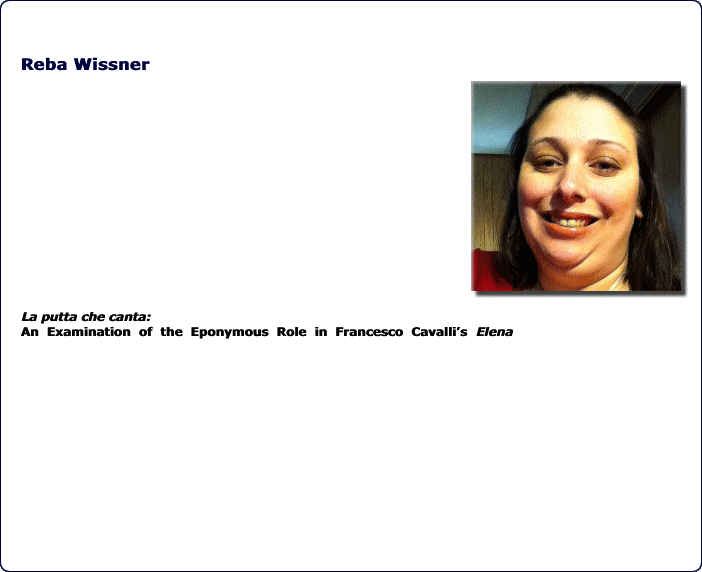

Reba Wissner is completing her Ph.D. in musicology at Brandeis University with a dissertation on Francesco Cavalli's 1659 opera, Elena. She received her B.A. in Music and Italian from Hunter College of the City University of New York and her M.F.A. in Musicology from Brandeis University (you can find the details in the recently published interview essay at https://essaysleader.com/write-an-interview-essay/). She is the author of several articles and has presented her research at conferences throughout the United States and Europe. She is a recipient of numerous awards and grants including a dissertation research grant from the Andrew W. Mellon Foundation. You can In addition to seventeenth-century Venetian opera, Ms. Wissner's other research interests are Music and Politics, Music and Immigration, Popular music, and the role of music in the original television series, The Twilight Zone.
What we know--or think that we know--about Helen of Troy is turned on its head in Francesco Cavalli’s 1659 Venetian opera, Elena. The opera’s libretto by both Giovanni Faustini and Nicolò Minato uses the trope of the adulteress Helen, but in a highly comedic manner, exploiting the various ways in which her “wandering ways” could be portrayed. Similarly “impure females” emerge when women appeared on the Venetian stages, as they were almost always suspected of being courtesans. Indeed, some times those suspicions held true. One such instance occurred during the original run of Elena. The title role of the opera was played by a famous Venetian courtesan of the day, Lucietta Gamba da Vidman, who was often referred to in Venice as “La putta che canta,” or “the whore that sings.” Curiously, not only is Elena the only opera in which Gamba was known to sing, but she is also the only courtesan known to sing the title role of a Venetian opera.
While some readings of the opera support the casting of Gamba as portraying Helen as a lascivious female, this paper explores the likelihood that the casting was meant to reverse this depiction. As a result, the opera makes Elena’s sexual prowess purely satirical, especially since it was performed during Carnival where stories were purposely reversed and altered, thus amplifying the comedy of the work. By examining what it meant to be a courtesan and the social implications of this occupation, I hope to show an alternate reading of the role of Helen in the opera.
